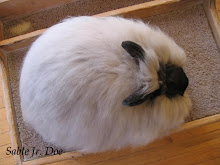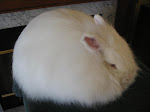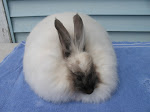Since this is the weekend of the famous Sheep and Wool Festival in Rhinebeck, NY, I thought I would relate some neat things that I learned this week about the Spinners in my family.
First I guess I should go farther back to relate a little history about my family. My mother (who travels with me to rabbit shows all the time) is originally an immigrant from a German village in the former Yugoslavia known as Verbas. The culture her family was part of was known as the 'Donau Schwaben' (or in English) the 'Danube Swabian' culture. Ethnic Germans living in what is now the country of Serbia, they had a unique way of life that involved unusual food dishes and a very devoted tradition of knitting, sewing, and fiber related handiwork. Every girl (and many men) growing up in this culture learned how to knit and embroider from a very early age, and they were known far and wide for their exceptional skill in this area.
My grandmother was the youngest of a large family, and for extra money she used to raise silkworms as a child and then sell the coccoons to a local silk factory. As an adult she married a man in the neighboring village (also Donau Schwaben), and they had several children. Once WWII began, her husband (my Grandfather) was drafted into the German army as part of the maintenance unit, and she was left at home in the village with her children.
One day towards the middle/end of the war, the people of Verbas got the horrifying news that the Russian army was on the march across Yugoslavia and headed straight toward the town burning and pillaging everything as they came. My Grandmother, who was in labor with my mother at the time, was unable to leave with the rest of the town so she stayed on for 3 more days until the baby was born. She and her inlaws (who stayed to wait with her) then loaded the bare necessities into a horse-drawn wagon, and ran out of the deserted town in the nick of time with her baby and two of the older children, minus one son who had died earlier and was buried at the local cemetery.
So my family escaped the town at the last minute and managed to join up with the wave of other refugees. They spent the next several days rushing through the countryside to the sound of falling bombs and the warning drums pounding non-stop in the towns telling everyone to evacuate. Over the next several years my Grandmother traveled across Europe with her children alone, staying in various shelters and DP camps in various countries in an effort to reach safety.
Eventually, several years later, she and my Grandfather (who had joined them again) arrived in New York City with their children, and they settled in a part of Queens where the remnants of the Danube Swabian population were finding new homes. They managed to find work at one of a number of knitting mills that had been set up by countrymen who were capitalizing on the business they knew best. Over time they were able to move out of the room they lived in behind an old storefront, and into a real house where life became more settled.
My own mother grew up and met my father (a Hungarian immigrant), and together they moved upstate after I and my siblings were born. Several times a year we went back to the city to visit my grandparents and the rest of our extended family, who were constantly making things such as knitted clothing, toys, and other handmade things for all the kids. There was never much money, but it didn't matter because their tiny house was always filled with delicious food every Christmas, and there were amazing handmade gifts under the tree and on the tree. Even today, years after her death, I still have all the sweaters and knitted toys that my Grandmother ever made for me. Most now sit on the beds of my kids--- on the same down featherbeds she threw in the wagon before they left her village so long ago.
My great grandfather in Yugoslavia made his living as a Weaver. My grandmother was an avid knitter, crocheter, and embroiderer all her life. Three of her four children became serious spinners and knitters, and my uncle Gunther, who owned and worked in knitting mills most of his life, recently picked up handspinning and won the skein contests at the Rhinebeck and Maryland festivals three years after learning, with 2 and 3 ply laceweight skeins prepared from scratch. His second skein, (the 3 ply) was made on an antique 1800s spinning wheel that he found and oiled up one day before spinning his winning skein.
Gunther came to the Rhinebeck festival with his grandaughter this weekend (who also spins), and my mother went to meet him and pick up fiber for her own projects. My aunt, a spinner and knitter as well, did not attend the festival this year but came up several times in the past.
This story doesn't have much (if anything) to do with rabbits, LOL. After hearing that my uncle is doing well with his spinning (which I hadn't known before), I got to thinking about how far a thing can come, and how deeply rooted a way of life can stay despite war, displacement, death, and tragedy. A needle and thread may seem like nothing big or important, and a sheep or rabbit don't matter very much more, but the simple things are the biggest and most important because they are far less likely to be taken away. It is a comfort to know that every time we go into our barns to groom, harvest, or plan future generations of angoras (and their precious wool), we participate in a legacy that is tied to the past and present of everyone.
Have a great week!
Sunday, October 18, 2009
Subscribe to:
Post Comments (Atom)























3 comments:
WOW!! How interesting a past. You are truly a lucky one to know so much of your roots! Bless the fiber of family and friendship may it always keep you and your family spun tightly together!
Thank you for sharing. This made my day. In a crazy world, it is important to remember where we came from.
My great grandfather in Yugoslavia also made his living as a weaver. He came to Ellis Island and settled in PA before traveling later settled in PA before traveling to Ohio where he worked as a builder and farmer the remainder of his life. I found a record of his passage at Ellis Island and the name of the ship upon which he traveled to America. Loved your story.
Post a Comment